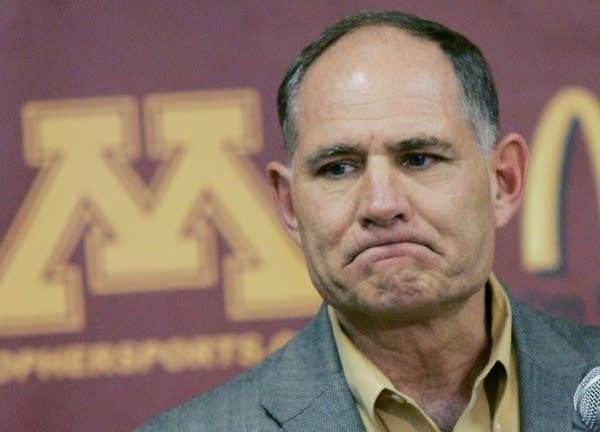Great challenges await U of M's next athletic director
Go Deeper.
Create an account or log in to save stories.
Like this?
Thanks for liking this story! We have added it to a list of your favorite stories.

Retiring University of Minnesota Athletics Director Joel Maturi will leave this June with a record of accomplishments: higher athlete grade point averages, a narrower budget deficit, and a wide array of small sports.
But there are also achievements that have eluded him over the last 10 years: Football or basketball championships — or at least winning programs.
That's the big job awaiting his successor. And by no means is it the only one.
Maturi's successor will face a department running an annual deficit of $2 million to $3 million. That puts it near the bottom of the Big 10 in profitability.
Turn Up Your Support
MPR News helps you turn down the noise and build shared understanding. Turn up your support for this public resource and keep trusted journalism accessible to all.
He or she will have to turn that around.
And then there are competing demands. For example, focus on the money makers, football and basketball, but don't neglect smaller sports. Recruit players who are focused on winning, but make sure they study, too. And above all, win. But do it cleanly.
KNOW THE CHALLENGE WELL

Maturi's predecessor, Mark Dienhart, knows the challenge well. "You can't pick and choose what you want to do," Dienhart said. "You have to do it all, and you have to do it all with some measure of success."
There will be many people who will make demands — university officials, students, fans, alumni and politicians. They know the stakes are high, and not just for the athletics department.
Anecdotal evidence suggests that when a university is successful on the field, it receives more public support. More people donate, legislatures agree to build more buildings, and more good students apply for admission.
That's because many people judge the workings of a university by its athletic success, said alumnus and former Timberwolves CEO Robert Stein. "People don't know how the physics department or math department really operate internally, but every day in the paper they pick up the results of sports," he said.
The incoming director will have some advantages: a dynamic new football coach, Jerry Kill; basketball coach Tubby Smith; and the recently built gem, TCF Bank Stadium.
DEVELOP THE BRAND
The University faces a marketing and fundraising disadvantage.
Unlike their more successful peers in small college communities, the Gophers compete for people's attention against several professional sports teams.
Often forgotten is that the athletics director does not run a professional team, Dienhart said.
"The problem is you can't go into the draft next year, or trade your players for other players," Dienhart said. "There's an impatience for change that can't be satisfied."
The university also lags in fundraising compared to more well-funded teams in the Big Ten.
That makes it tough to compete for top high school players who are looking for cutting-edge facilities, Dienhart said.
Despite those challenges, first priority will be fielding winning teams, especially in money-making sports such as football and basketball.
Those two sports earned about $23 million last year for the university. But that has not been enough to fund many of the university's two-dozen other sports in recent years.

WHERE TO CUT?
Whether or not to cut some sports will be a decision for the new director. Should their funding go instead to football and basketball, as some suggest?
Nicole Murphey, a sophomore on the track and field team, says no.
"It's not always about the money," Murphey said. "It's about the participation and the actual experience that you get to have through university sports."
Perhaps the greatest tradeoff the incoming director may have to make will be between athletics and academics.
Only a handful of universities, including Michigan and Washington, have been able to maintain both at high levels, said Duke economist Charles Clotfelter, author of the book "Big-Time Sports in American Universities."
"No university can have a competitive big-time sports program without making compromises, and the first compromises that the university has to make are in the academic realm," Clotfelter said.
Tougher still is having top programs in both areas while keeping the athletics department in the black.
The university shouldn't settle for second best, said alumnus Tom McDonald.
"I believe strongly that you can have a person as AD of high integrity, work ethic, pushing, you know, gender equality and also put the best Division I teams you can on the field," McDonald said.
The U expects to have a new athletic director by July 1.





